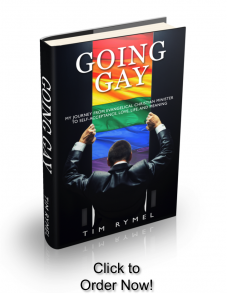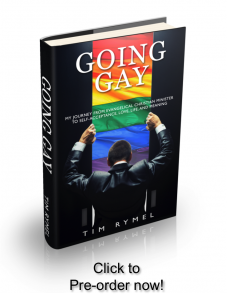Tim Rymel's Blog, page 21
July 24, 2014
The Gift of Deconstruction
 Kim Harrison tweeted to Senator Ted Cruz, “In regards to the invasion of our national sovereignty by illegal immigrants – I DO NOT want to hear about compassion and humanity…”1 Harrison was not pleased to hear that conservative Cruz handed out teddy bears and toys to the parentless children attempting to cross the U.S. border.
Kim Harrison tweeted to Senator Ted Cruz, “In regards to the invasion of our national sovereignty by illegal immigrants – I DO NOT want to hear about compassion and humanity…”1 Harrison was not pleased to hear that conservative Cruz handed out teddy bears and toys to the parentless children attempting to cross the U.S. border.
“Jesus would not break the law!” shouted another woman to the children, who could only understand her tone, not her words. In his usual sardonic approach, John Stewart pointed out that Jesus was, in fact, known for breaking the laws.2
The irony in these statements is that those who hold these beliefs don’t see the irony in their statements. I held similar beliefs for over 25 years. I was pro-life and pro-death penalty. I said that Jesus loved sinners and that no one was better than anyone else, while I voted to deny equal rights to all human beings. I spoke of the love and compassion of my Savior, while preaching death and hell to those who refused to believe the message like I did.
Too often we imprison ourselves attempting to live up to an ideal that reinforces our beliefs instead of questioning the ideals that place us in those prisons in the first place. In the process, we often nullify the very foundation of those beliefs.
Mike Lux, author of The Progressive Revolution: How the Best in America Came to Be, wrote, “Conservative Christians manage to ignore the literally many hundreds of Biblical quotes about social justice by making Christianity a religion solely focused on one very selfish goal: whether they get into heaven or not.” 3
I recently heard a lecture by Dr. Darryl Ray4 who said part of our inability to change this line of reasoning is because we get stuck in cyclical behavior: we return to our beliefs for clarification, which only reinforces what we already believe. In short, this is the definition of insanity. We do the same things repeatedly, expecting different results.
When my wife divorced me, I began to question what I believed about God. One thing led to another and, before I knew it, I had deconstructed a life-long held belief system. Anything and everything was up for grabs. I could do whatever I wanted without an ounce of guilt, or worry about going to hell.
Not only did I learn that I had no interest in dishonesty, espionage, murder or other overt evil deeds, purported in the Bible as the acts of non-Christians, I was in fact a good person. I met other good people. Together, we began doing good deeds for others. Life-long depression lifted, God came to life as viable, loving, intricate, philosophical, scientific, compassionate, and caring.
Questioning one’s faith can feel like betrayal of God and country. Deconstructing one’s belief system is nearly impossible without a reason to do so. Even a willful effort can take years, if not decades. Those of us forced to rethink our beliefs go through a grief process of denial, anger and pleading with God to put things back the way they were. Seldom do we see the blessing that lies just over the bridge of acceptance.
However, the rewards are immeasurable. We discover that the very heart of God lies in the uncertainty of man. God is never threatened by questions; He does not abide in political parties; He cannot be contained in the walls of churches, denominations, doctrines or creeds. In fact, it seems God hangs out most often with immigrants of faith, anxious to see what’s on the other side.
1 http://www.forwardprogressives.com/wp-content/uploads/2014/07/Capture1.png
2 http://thedailyshow.cc.com/full-episodes/4od1ye/july-14–2014—dahlia-lithwick
3 http://www.huffingtonpost.com/mike-lux/the-ultimate-contradictio_b_499056.html
4 https://www.youtube.com/watch?v=dFe70QabxvQ
Tim
Please share your thoughts below.
Hire Tim to speak at your event
 Tags: Christian belief, conservative, immigration, LGBT, politics, religion and homosexuality
Tags: Christian belief, conservative, immigration, LGBT, politics, religion and homosexualityDel.icio.us


TweetThis

Digg

StumbleUpon

Comments: 0 (Zero), Be the first to leave a reply!You might be interested in this:
 Why are the Christians silent?
Why are the Christians silent? Book Review - Torn: Rescuing the Gospel from the Gays-vs.-Christians Debate
Book Review - Torn: Rescuing the Gospel from the Gays-vs.-Christians Debate Believing is Perceiving
Believing is Perceiving  Can You Show Compassion without Compromise?
Can You Show Compassion without Compromise? 5 Ways Pastors Can Reach Out To The Gay CommunityCopyright © Tim Rymel [The Gift of Deconstruction], All Right Reserved. 2014.
5 Ways Pastors Can Reach Out To The Gay CommunityCopyright © Tim Rymel [The Gift of Deconstruction], All Right Reserved. 2014.The post The Gift of Deconstruction appeared first on Tim Rymel.
July 17, 2014
What will the neighbors think?
 The first time I ever ventured into the gay community I was working as a substitute teacher at an Evangelical Christian school. I had recently left the Republican Party, because they were too liberal. California’s now infamous Proposition 8 was all the talk among the gay men with whom I was dining. I’d voted yes, against gay marriage. It’s no wonder when I left that night that I didn’t exactly feel like I found my people. In fact, it was a year before I would come back.
The first time I ever ventured into the gay community I was working as a substitute teacher at an Evangelical Christian school. I had recently left the Republican Party, because they were too liberal. California’s now infamous Proposition 8 was all the talk among the gay men with whom I was dining. I’d voted yes, against gay marriage. It’s no wonder when I left that night that I didn’t exactly feel like I found my people. In fact, it was a year before I would come back.
Most of my life was spent trying to figure out where I fit in. I was frequently the only white guy in black churches when I was a musician. My, now, middle of the road politics are too liberal for the conservatives and too conservative for the liberals. I’m too gay for some Christians and too Christian for some gays. It’s always something.
For many years I hid pieces of my life from at least someone, significant or otherwise. I wondered what they – my community, family, friends, co-workers – would think of me if I shared my real life with them. I didn’t want to lose the perceived security by risking it. Besides, my life felt insecure enough as it was. If they didn’t accept me, who would?
When I finally got to the place that risk was less risky than the shame that consumed me, I took the risk. And I found out what the neighbors really thought. Here are a few of their opinions:
“Finally! Someone is willing to say what I’ve been thinking.”
“I’m so glad I’m not alone.”
“You are brave and you inspire me.”
“I’ve never felt closer to you.”
“Can I tell you what’s going on with me?”
“Me, too!”
We don’t find our true communities until we find our true selves and are willing to share our lives and imperfections with the people around us. Until then, we are nurturing a community to which we don’t belong. When I got real, not only did I find my community, I lost interest in what anyone else thought. It no longer mattered.
I learned that honesty breeds security, while dishonesty nurtures perception. Perception builds walls around us that keep people away and leave us locked up in a prison of our own insincerity. Though virtual, no one can penetrate the barrier of our making. The only way through comes from the inside.
Our culture has built a system of competition among neighbors. Who has the most stuff? Who has the best family? Cultural Christianity adds another layer by asking, Who is the most godly? Whose life is most perfect? Neither represents real life that is complex, confusing and, at times, crushing. The next time you ask, “What will the neighbor’s think?” Remember they are probably thinking, I wish I knew someone who could relate to what I’m going through.
Perhaps that’s you.
Tim
Please share your thoughts below.
Hire Tim to speak at your event
 Tags: authenticity, Christian and gays, christian living, homosexuality, LGBT, Parents, PFLAG
Tags: authenticity, Christian and gays, christian living, homosexuality, LGBT, Parents, PFLAGDel.icio.us


TweetThis

Digg

StumbleUpon

Comments: 0 (Zero), Be the first to leave a reply!You might be interested in this:
 Believing is Perceiving
Believing is Perceiving  Keeping Up Appearances
Keeping Up Appearances Be Ye Transformed
Be Ye Transformed Why I Don't Talk About Scriptures
Why I Don't Talk About Scriptures Can You Show Compassion without Compromise?Copyright © Tim Rymel [What will the neighbors think?], All Right Reserved. 2014.
Can You Show Compassion without Compromise?Copyright © Tim Rymel [What will the neighbors think?], All Right Reserved. 2014.The post What will the neighbors think? appeared first on Tim Rymel.
July 8, 2014
5 Ways Pastors Can Reach Out To The Gay Community
 I recently received an email from a pastor asking how he could reach out to the gay community without compromising his Biblical view of marriage. The fact that a conservative pastor is asking how to reach out to the gay community at all speaks volumes to me. We can’t have a dialogue if we’re not talking.
I recently received an email from a pastor asking how he could reach out to the gay community without compromising his Biblical view of marriage. The fact that a conservative pastor is asking how to reach out to the gay community at all speaks volumes to me. We can’t have a dialogue if we’re not talking.
While I have my own response to his question, I wanted to hear directly from the gay community. I asked and this is what they said:
Don’t come with an agenda
If your sole purpose is to evangelize the gay community by telling them there is something wrong with them and that they need Jesus, don’t bother reaching out. We’ve heard that message before. It was made loud and clear by the likes of Fred Phelps, Pat Robertson, Jerry Falwell, and many pastors before and after them.
Drop the assumptions
Misinformation about the LGBT community abounds in conservative churches. Much of that, sadly, came from organizations like Exodus International. Ministries, such as Love in Action (where I worked), perpetuated the idea that homosexuals are pedophiles or mentally unstable. Research has long since debunked those myths and found LGBT persons indistinguishable from heterosexuals on psychological tests. Also, none of us chose our sexual orientation anymore than a heterosexual chose his or her orientation. We choose to love and be loved, just like you do. Period.
3. Contact LGBT affirming pastors and find out what they do.
Many affirming pastors have listened and heard the heart of members of the gay community. They know them well and they’ve learned how to love them. Call them. Ask what they do that is effective. Even if you don’t agree with their theology, many of these pastors are a wealth of information on how to love people unconditionally.
4. Put down your Bibles
It’s easy to hide behind Scriptures, but by stepping from behind the pulpit and sitting in the pew you actually become human. Once the platform of doctrines and ideologies are removed, we’re all just the same. Jesus seldom quoted Scriptures. He told stories from real life, relating to people in ways they could understand. Besides, practically EVERY gay person knows the anti-gay Scriptures. Many have been beat over the head with those Scriptures, even if they never attended a church. There are over 33,000 denominations, each with a different take on the Bible, all believing they are right and the others are wrong. Set aside your interpretation of the Bible and choose to be human.
5. Be prepared to change
While I appreciate that a conservative church pastor wants to talk, many come with the idea that it’s the gay person who needs to change. Not one time have I ever seen a Christian walk away unchanged after a genuine and authentic relationship has been established with someone from the gay community. Compromise, a word that scares many Christians, takes on new meaning when people share their lives with honesty and love. Start there and see what God may have in mind for you.
Tim
Please share your thoughts below.
Hire Tim to speak at your event
 Tags: Christians and gays, homosexuality and Christians, how to minister to LGBT people, minister to gays
Tags: Christians and gays, homosexuality and Christians, how to minister to LGBT people, minister to gaysDel.icio.us


TweetThis

Digg

StumbleUpon

Comments: 0 (Zero), Be the first to leave a reply!You might be interested in this:
 Angry At A God Who Doesn't Exist
Angry At A God Who Doesn't Exist Be Ye Transformed
Be Ye Transformed Book Review - Torn: Rescuing the Gospel from the Gays-vs.-Christians Debate
Book Review - Torn: Rescuing the Gospel from the Gays-vs.-Christians Debate Can You Show Compassion without Compromise?
Can You Show Compassion without Compromise? Believing is Perceiving Copyright © Tim Rymel [5 Ways Pastors Can Reach Out To The Gay Community], All Right Reserved. 2014.
Believing is Perceiving Copyright © Tim Rymel [5 Ways Pastors Can Reach Out To The Gay Community], All Right Reserved. 2014.The post 5 Ways Pastors Can Reach Out To The Gay Community appeared first on Tim Rymel.
June 28, 2014
Be Ye Transformed
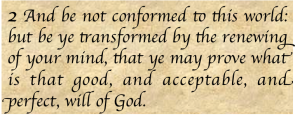 I paced the floor of my upstairs apartment night after night, memorizing books of the Bible: Galatians, Ephesians, 1st Timothy, 2nd Timothy. I must have sounded like a madman to the neighbors. I thought by committing Scriptures to memory my struggle with homosexuality would end. God would transform my very existence from an ugly encapsulated gay caterpillar to a beautiful heterosexual butterfly. In reality, I was pleading with God to help me live up to an unachievable ideal.
I paced the floor of my upstairs apartment night after night, memorizing books of the Bible: Galatians, Ephesians, 1st Timothy, 2nd Timothy. I must have sounded like a madman to the neighbors. I thought by committing Scriptures to memory my struggle with homosexuality would end. God would transform my very existence from an ugly encapsulated gay caterpillar to a beautiful heterosexual butterfly. In reality, I was pleading with God to help me live up to an unachievable ideal.
I grew up in church learning the mystical approach to becoming a better Christian: learn the Bible, pray and believe God. While that’s a great recipe for creating religious zealots, it doesn’t lead to genuine change. Here’s why.
Lasting change is a multi-step process. It involves self-awareness, motivation, and critical thinking. Change only begins to happen when we take an honest inventory of who we are. Even then, it’s one thing to recognize our issues, quite another to do something about them. How many of us have looked at the scale, realized we had a problem with our weight, and forgot all about it by the very next meal? Awareness doesn’t always lead us to change; sometimes it just leads us to beating ourselves up.
True change NEVER involves shame. Shame sends us into hiding and lying about who we are. Authenticity is the only vehicle capable of taking us down the road to transformation. I don’t become a better person by denying who I am; rather, I honor the journey by embracing my flaws and imperfections. When I stop fighting against nature, nature becomes a force that fights with me, not against me.
Likewise, forced motivation never works. Forced motivation comes from guilt, the feeling that we should be doing something we’re not. True motivation comes from within. It is a genuine desire to love because we want to, not because we have to.
There is no quick road to transformation. Memorizing volumes of books, religious or otherwise, may make you smart – or perhaps mad – but knowledge alone will not change you. Transformation is a natural progression of growth, as we choose to love, show compassion and apply wisdom and meaning to our journeys.
May your life be continually transformed.
Tim
Please share your thoughts below.
Hire Tim to speak at your event
 Tags: Evanglical Christianity and gays, Faith and Struggle, gay christian, LGBT
Tags: Evanglical Christianity and gays, Faith and Struggle, gay christian, LGBTDel.icio.us


TweetThis

Digg

StumbleUpon

Comments: 0 (Zero), Be the first to leave a reply!You might be interested in this:
 Book Review: A Life of Unlearning One Man's Journey to Find the Truth (Audiobook) by Anthony Venn-Brown
Book Review: A Life of Unlearning One Man's Journey to Find the Truth (Audiobook) by Anthony Venn-Brown A Message Worth Repeating
A Message Worth Repeating Would You Jump Off A Cliff to Save Your Life?
Would You Jump Off A Cliff to Save Your Life? Sin, Shame and the Ex-gayCopyright © Tim Rymel [Be Ye Transformed], All Right Reserved. 2014.
Sin, Shame and the Ex-gayCopyright © Tim Rymel [Be Ye Transformed], All Right Reserved. 2014.The post Be Ye Transformed appeared first on Tim Rymel.
June 27, 2014
Book Review: A Life of Unlearning One Man’s Journey to Find the Truth (Audiobook) by Anthony Venn-Brown
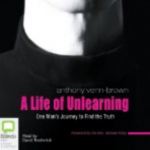 My assistant introduced me to the work of Anthony Venn-Brown. Immediately, I was intrigued by his story: a former Assemblies of God evangelist gone gay. An oddly familiar theme.
My assistant introduced me to the work of Anthony Venn-Brown. Immediately, I was intrigued by his story: a former Assemblies of God evangelist gone gay. An oddly familiar theme.
Venn-Brown has an impressive list of ministry credentials and achievements. He was born and raised in Australia, where he currently lives. As I listened to him tell his story of rising through the ranks of the Assemblies of God in the ‘80s, I imagined where I was at that time in the U.S., deeply entrenched as an Assemblies of God music minister. We celebrated our charismatic and successful evangelists. I’m sure I heard of him, but I don’t remember.
Venn-Brown doesn’t hold anything back. Sometimes it felt as if I was listening to a novel, and at other times erotica. I wasn’t sure who his audience was. The information is much too risqué for your average church-going, American family, who simply wants to understand the homosexual struggle. Though titillating, the details didn’t seem relevant to the story. (Not to say I didn’t enjoy them…ahem.)
I also didn’t need to hear all of the relationships and encounters Venn-Brown painstakingly described. By the time I neared the end of the book, I began to wonder if he had any concept of love at all. Each of his many sexual trysts were positioned as though he had found the one person with whom he would experience lasting love. Inevitably, however, those relationships ended and the cycle repeated itself. Those were the kinds of stories I’d heard about in the ‘80s that drove me to ex-gay ministry for help. In his defense, Venn-Brown didn’t give up on love in spite of the odds against him.
He aptly identifies his struggle with God. The mental acrobats of trying to make sense of events, such as hearing God give him a specific date he would be released from the army and seeing it come to pass, countered other experiences which led him to question if anything he believed as a Christian was ever really true. It’s a human struggle to which most of us can relate. For those of us who served in ministry, it is a bitter battle between what feels like the two halves of our core.
I have to give Venn-Brown props for the courage to tell his story. My heart ached for his children and his wife as he repeatedly let them down. It was especially difficult to hear how he eventually left them without ever saying goodbye. As a father, leaving my children is an act that is unfathomable. Still, Venn-Brown never attempts to justify or make excuses for his behavior. He simply told his story.
Venn-Brown eventually comes to many of the conclusions I came to in my book: God is bigger than we believed Him to be and we are called to be authentic and honest with others and ourselves. It is then that we find our purpose. His conclusion is brief in comparison to his story.
Venn-Brown was ahead of his time by coming to terms with his sexuality and, eventually, his Christian faith. Many of the things he has worked for through his organization, Ambassadors and Bridge Builders International, is beginning to have a worldwide impact. Many more loving and LGBT accepting Christian organizations, particularly in the traditional evangelical churches, are popping up around the world. Anthony Venn-Brown has long since been leading this reformation.
Regardless of whether or not one agrees with Venn-Brown’s conclusions, his story is worth reading. It contains the history of where we have come as a Christian LGBT community and offers a gentle reminder of a history we don’t want to repeat.
Click here to buy a copy of A Life of Unlearning from Audible.com.
Tim
Please share your thoughts below.
Hire Tim to speak at your event
 Tags: Anthony Venn-Brown, Faith and Struggle, Gay Christians, LGBT
Tags: Anthony Venn-Brown, Faith and Struggle, Gay Christians, LGBTDel.icio.us


TweetThis

Digg

StumbleUpon

Comments: 0 (Zero), Be the first to leave a reply!You might be interested in this:
 Gays, Christians and Change Management
Gays, Christians and Change Management Believing is Perceiving
Believing is Perceiving  You Don't Have to Love Me
You Don't Have to Love Me Why is Life so Hard?!
Why is Life so Hard?! Can You Show Compassion without Compromise?Copyright © Tim Rymel [Book Review: A Life of Unlearning One Man's Journey to Find the Truth (Audiobook) by Anthony Venn-Brown], All Right Reserved. 2014.
Can You Show Compassion without Compromise?Copyright © Tim Rymel [Book Review: A Life of Unlearning One Man's Journey to Find the Truth (Audiobook) by Anthony Venn-Brown], All Right Reserved. 2014.The post Book Review: A Life of Unlearning One Man’s Journey to Find the Truth (Audiobook) by Anthony Venn-Brown appeared first on Tim Rymel.
Would You Jump Off A Cliff to Save Your Life?
 Phillip was married with three children and living the good life in the suburbs of a Northern California town. He was a successful lawyer at an environmental law firm. Phillip loved his wife and family, but couldn’t stop meeting guys for an occasional hookup. Inevitably, he felt guilty after every encounter, but he knew he’d do it again.
Phillip was married with three children and living the good life in the suburbs of a Northern California town. He was a successful lawyer at an environmental law firm. Phillip loved his wife and family, but couldn’t stop meeting guys for an occasional hookup. Inevitably, he felt guilty after every encounter, but he knew he’d do it again.
Charlene was the mother of two, held a PhD in Biblical studies and taught at a local Bible College in a big Mid-western city. In spite of her loving husband and well-earned reputation as a woman of integrity, Charlene was living a lie. The despair of hiding her truth as a transgender person drove her to a secret life of alcoholism. She attempted suicide on more than one occasion. Her family kept it a secret.
On the outside, it looked like these people had everything anyone could ever want. Why couldn’t they be happy? What drives someone to put his or her entire life, career and family at risk?
Love.
It seems counter-intuitive. Why participate in risky behaviors and lose a seemingly secure environment of family and status? Inside every human being lives the desire to be known for exactly who we are, not who we are perceived to be. Living a lie, even if only we know it, can drive us mad.
Psychotherapist Ken Page wrote:
“When we’re denied love, our battle to reclaim it teaches everyone what love really means. Virtually every LGBT person is forced to make a choice: We must choose between self-acceptance and self-loathing. Truth and safety. Yet this choice is universal. It’s bigger than sexual orientation or gender identity. It’s everyone’s challenge. Being the first to say “I love you.” Expressing a part of ourselves we’ve hidden from everyone. Standing up for an unpopular idea. Saying “no” to our own guilt and shame so we can move ahead with what really matters to us. There are countless ways to come out.”1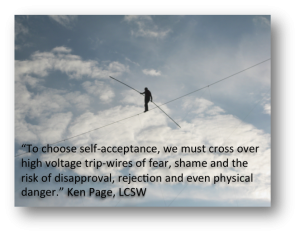
My introduction to heterosexual marriage was difficult at best. Life, by being obedient to God, as I understood it, soon became perfunctory. The American dream of fitting in was equivalent to getting a new car: within the year, the new car smell was gone and the cost of maintenance began to outweigh the emotional cost of keeping the car. Life became a list of things to do to maintain status quo. I was dying a slow, painful, passionless death. I wanted to live.
Though divorce was decided for me, it was still six more years before I found the courage to step outside the box I was certain contained all the answers. Living, I discovered, was all about uncertainty. It was the biggest step of faith I’d ever taken. The willingness to get rejected on a grander scale. It was jumping off a cliff with nothing more than a hope that a branch would stop the fall on the way down.
For years I preached that people should follow the rules. Think inside the box. Color inside the lines. Like Columbus’ crew, I feared sailing too far in any direction meant falling into the abyss.
As it turned out, the further I sailed the more enchanted with life I became. Risks turned into discoveries. Admissions of guilt became calls for friendships. My pain turned into my passion.
I was finally alive.
1Page, Ken, Finding Love, Why Coming Out Isn’t Just for Gay People, Psychology Today, May 5, 2013, http://www.psychologytoday.com/blog/finding-love/201305/why-coming-out-isnt-just-gay-people
Tim
Share what you think below.
Hire Tim to speak at your event
 Tags: christian living, gay christian, LGBT, Shame
Tags: christian living, gay christian, LGBT, ShameDel.icio.us


TweetThis

Digg

StumbleUpon

Comments: 0 (Zero), Be the first to leave a reply!You might be interested in this:
 Believing is Perceiving
Believing is Perceiving  Truth or Dare (to Love)
Truth or Dare (to Love) Gays, Christians and Change Management
Gays, Christians and Change Management Why are the Christians silent?
Why are the Christians silent? ChurchianityCopyright © Tim Rymel [Would You Jump Off A Cliff to Save Your Life?], All Right Reserved. 2014.
ChurchianityCopyright © Tim Rymel [Would You Jump Off A Cliff to Save Your Life?], All Right Reserved. 2014.The post Would You Jump Off A Cliff to Save Your Life? appeared first on Tim Rymel.
June 21, 2014
Why I Don’t Talk About Scriptures
 After 25 years in ministry, three years of Bible College, and countless hours of Bible study, I’ve learned the Scriptures well. For decades I tried to reconcile my sexuality and faith, particularly concentrating on those few passages that relate to the topic of homosexuality. I wasn’t looking for a way around the passages to justify my behavior. In fact, I wasn’t participating in any behavior at all. I was trying to figure out how to make the feelings stop. I believed the Bible held the answers.
After 25 years in ministry, three years of Bible College, and countless hours of Bible study, I’ve learned the Scriptures well. For decades I tried to reconcile my sexuality and faith, particularly concentrating on those few passages that relate to the topic of homosexuality. I wasn’t looking for a way around the passages to justify my behavior. In fact, I wasn’t participating in any behavior at all. I was trying to figure out how to make the feelings stop. I believed the Bible held the answers.
Memorizing Scriptures, having demons cast out of me, and fasting never changed anything. If the Bible held the answers, I eventually determined, I had to look at it differently. Yet, the thought of changing a view of Scriptures as a fundamentalist felt outright blasphemous.
I knew from my time in ministry, and from vigorous Biblical studies, that the Scriptures have been used to justify behaviors and actions of all kinds throughout their history, including killing, discrimination, hatred, arguments, and divorce. A Scriptural case can be made for virtually anything.
In fact, the Scriptures have been the source of disputes and wars since their inception. In EVERY case it was a matter of interpretation. Examples can be found in the Bible itself, such as Matthew 12:2
“But when the Pharisees saw this they said to him, ‘Look, your disciples are doing what is against the law to do on the Sabbath.’”
And Acts 15:1-2a
“Certain people came down from Judea to Antioch and were teaching the believers: ‘Unless you are circumcised, according to the custom taught by Moses, you cannot be saved.’ 2 This brought Paul and Barnabas into sharp dispute and debate with them.”
Roman Emperor Constantius II, the son of Constantine the Great, instituted the first anti-pagan laws between 337 and 361 A.D. (Kirsch, J., 2004, God against the Gods, pp. 200-1, Viking Compass). This is when Rome was considered a Christian Empire. By the 350s the death penalty went into affect for anyone who performed or attended pagan sacrifices, or worshipped idols (Theodosian Code 16.10.6).
“Christian Empire” sounds eerily familiar to “Christian Nation.”
The Bible, like any other book or document, I eventually realized, can mean almost anything, especially when you introduce complexities such as literal vs. metaphorical vs. allegorical vs. poetic meanings. On top of that you have historical and cultural overlays, not to mention language and concept interpretation.
When my Mexican-American fiancée tells me he has a difficult time interpreting simple Spanish to English phrases because there are no English words to capture the nuances of the language, I can only imagine how hard it is to capture the meaning and nuances of an ancient language from a culture we can only surmise from history.
According to World Christian Encyclopedia, there are over 33,000 Christian denominations worldwide (Oxford University Press, 2001). Of course, every one of those 33,000 denominations would tell you that they are right and others are wrong.
Evangelical Christianity, similar to what we know today, began in the 1730s, according to David Bebbington, historian and professor at the University of Stirling in Scotland. However, religious scholar, Randal Balmer, noted that:
“Evangelicalism itself…is a quintessentially North American phenomenon, deriving as it did from the confluence of Pietism, Presbyterianism, and the vestiges of Puritanism. Evangelicalism picked up the peculiar characteristics from each strain – warmhearted spirituality from the Pietists (for instance), doctrinal precisionism from the Presbyterians, and individualistic introspection from the Puritans – even as the North American context itself has profoundly shaped the various manifestations of evangelicalism: fundamentalism, neo-evangelicalism, the holiness movement, Pentecostalism, the charismatic movement, and various forms of African-American and Hispanic evangelicalism” (Encyclopedia of Evangelicalism, Louisville, KY: Westminster John Knox Press, 2002).
In spite of what many evangelicals think, their interpretation of the Bible most certainly does not date back to the beginning of Christendom. It has changed and morphed with time and culture. Really, one needs to look no further than the concept of slavery. In 1860, Rev. James Thornwell wrote:
“The parties in this conflict are not merely Abolitionists and slaveholders, they are Atheists, Socialists, Communists, Red Republicans, Jacobins on the one side and the friends of order and regulated freedom on the other” (USHistory.org, u.d.)
Change a couple of words and you have this today:
“The parties in this conflict are not merely anti-gay and pro-gay, they are Atheists, Socialists, Communists, Democrats, Radicals on the one side and the friends of God and Tea Party Republicans on the other.”
I don’t deny the efficacy of Scripture. However, when one group claims it as “absolute truth” and proceeds to interpret it without any historical, cultural or contextual references, refutes scientific facts, and oppresses another group, Scripture become purely tyrannical. The Bible is then fodder for enforcing a set of beliefs and ideals, rather than a pillar of godly authority.
I refuse to engage.
There are many, many books on biblical interpretations from every imaginable angle. One does not prove nor disprove another, nor set itself up as the final word on all things Christian. Remember that theology is simply the study of God and doctrine is merely a system of teachings related to a set of beliefs. Neither, in and of themselves, declares absolute authority.
As an educator, when I teach a class, regardless of the topic, I scan the room and take my best guess at which cultures, backgrounds and experiences are represented. I know that I’m going to say the same thing multiple times in multiple ways to make a point. Even then, some will interpret my words to mean something else, others will understand it only within the confines of their own experiences, and many will not grasp the concept at all. And I don’t teach rocket science.
Humans, in our finite state, cannot comprehend concepts beyond our own cultural, group and individual experiences. We will always interpret information and understandings based on our beliefs and backgrounds. Always.
The more experiences we have and the more people with whom we come in contact will expand our understanding and perceptual interpretations, but we are always at the mercy of the amount of information we are physically able to comprehend. By design, I believe, that amount of information is limited and requires us to interact with people unlike ourselves. God, on the other hand, is infinite in knowledge, wisdom and understanding.
Confining God to a single book reduces the Creator of the Universe to a mythical genie, incapable of anymore than He has already been predefined as, and predetermined to do. It nullifies His hand in the wonders and discoveries of modern day science. It stymies the mystical relationship of human-deity relationship to a system of religious tradition and institutional practice.
I will let others interpret and defend what they may or may not consider Scriptures. They can hash out and argue definitions and words. I have excused myself from fruitless discussions and arguments. I’d rather spend my time being grateful for the life God has given me and loving others no matter what they believe.
Tim
Share what you think below.
Hire Tim to speak at your event
 Tags: gay christian, gay rights, Gays and Religion, LGBT, reparative therapy
Tags: gay christian, gay rights, Gays and Religion, LGBT, reparative therapyDel.icio.us


TweetThis

Digg

StumbleUpon

Comments: 4 comments on this itemYou might be interested in this:
 Why is Life so Hard?!
Why is Life so Hard?! Truth or Dare (to Love)
Truth or Dare (to Love) Keeping Up Appearances
Keeping Up Appearances Angry At A God Who Doesn't Exist
Angry At A God Who Doesn't Exist Sin, Shame and the Ex-gayCopyright © Tim Rymel [Why I Don't Talk About Scriptures], All Right Reserved. 2014.
Sin, Shame and the Ex-gayCopyright © Tim Rymel [Why I Don't Talk About Scriptures], All Right Reserved. 2014.The post Why I Don’t Talk About Scriptures appeared first on Tim Rymel.
Why I Don’t Talk About the Bible
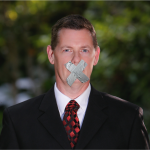 After 25 years in ministry, three years of Bible College, and countless hours of Bible study, I’ve learned the Scriptures well. For decades I tried to reconcile my sexuality and faith, particularly concentrating on those few passages that relate to the topic of homosexuality. I wasn’t looking for a way around the passages to justify my behavior. In fact, I wasn’t participating in any behavior at all. I was trying to figure out how to make the feelings stop. I believed the Bible held the answers.
After 25 years in ministry, three years of Bible College, and countless hours of Bible study, I’ve learned the Scriptures well. For decades I tried to reconcile my sexuality and faith, particularly concentrating on those few passages that relate to the topic of homosexuality. I wasn’t looking for a way around the passages to justify my behavior. In fact, I wasn’t participating in any behavior at all. I was trying to figure out how to make the feelings stop. I believed the Bible held the answers.
Memorizing Scriptures, having demons cast out of me, and fasting never changed anything. I prayed earnestly for decades that God would remove my same-sex attractions. On the verge of a mental breakdown, it was time to look at things differently.
The Scriptures have been the source of disputes and wars since their inception. In EVERY case it was a matter of interpretation. Examples can be found in the Bible itself, such as Matthew 12:2
“But when the Pharisees saw this they said to him, ‘Look, your disciples are doing what is against the law to do on the Sabbath.’”
And Acts 15:1-2a
“Certain people came down from Judea to Antioch and were teaching the believers: ‘Unless you are circumcised, according to the custom taught by Moses, you cannot be saved.’ 2 This brought Paul and Barnabas into sharp dispute and debate with them.”
Roman Emperor Constantius II, the son of Constantine the Great, instituted the first anti-pagan laws between 337 and 361 A.D. (Kirsch, J., 2004, God against the Gods, pp. 200-1, Viking Compass). This is when Rome was considered a Christian Empire. By the 350s the death penalty went into affect for anyone who performed or attended pagan sacrifices, or worshipped idols (Theodosian Code 16.10.6).
“Christian Empire” sounds eerily familiar to “Christian Nation.”
The Bible, like any other book or document is up for interpretation, especially when you introduce complexities such as literal vs. metaphorical vs. allegorical vs. poetic meanings. On top of that you have historical and cultural overlays, not to mention language and concept interpretation.
When my Mexican-American fiancée tells me he has a difficult time interpreting simple Spanish to English phrases because there are no English words to capture the nuances of the language, I can only imagine how hard it is to capture the meaning and nuances of an ancient language from a culture we can only surmise from history.
According to World Christian Encyclopedia, there are over 33,000 Christian denominations worldwide (Oxford University Press, 2001). Of course, every one of those 33,000 denominations would tell you that they are right and others are wrong.
Evangelical Christianity, similar to what we know today, began in the 1730s, according to David Bebbington, historian and professor at the University of Stirling in Scotland. However, religious scholar, Randal Balmer, noted that:
“Evangelicalism itself…is a quintessentially North American phenomenon, deriving as it did from the confluence of Pietism, Presbyterianism, and the vestiges of Puritanism. Evangelicalism picked up the peculiar characteristics from each strain – warmhearted spirituality from the Pietists (for instance), doctrinal precisionism from the Presbyterians, and individualistic introspection from the Puritans – even as the North American context itself has profoundly shaped the various manifestations of evangelicalism: fundamentalism, neo-evangelicalism, the holiness movement, Pentecostalism, the charismatic movement, and various forms of African-American and Hispanic evangelicalism” (Encyclopedia of Evangelicalism, Louisville, KY: Westminster John Knox Press, 2002).
In spite of what many evangelicals think, their interpretation of the Bible most certainly does not date back to the beginning of Christendom. It has changed and morphed with time and culture. Really, one needs to look no further than the concept of slavery. In 1860, Rev. James Thornwell wrote:
“The parties in this conflict are not merely Abolitionists and slaveholders, they are Atheists, Socialists, Communists, Red Republicans, Jacobins on the one side and the friends of order and regulated freedom on the other” (USHistory.org, u.d.)
Change a couple of words and you have this today:
“The parties in this conflict are not merely anti-gay and pro-gay, they are Atheists, Socialists, Communists, Democrats, Radicals on the one side and the friends of God and Tea Party Republicans on the other.”
I don’t deny the efficacy of Scripture. However, when one group claims it as “absolute truth” and proceeds to interpret it without any historical, cultural or contextual references, refutes scientific facts, and oppresses another group, Scripture become purely tyrannical. The Bible is then fodder for enforcing a set of beliefs and ideals, rather than a pillar of godly authority.
I refuse to engage.
There are many, many books on biblical interpretations from every imaginable angle. One does not prove nor disprove another, nor set itself up as the final word on all things Christian. Remember that theology is simply the study of God and doctrine is merely a system of teachings related to a set of beliefs. Neither, in and of themselves, declares absolute authority.
As an educator, when I teach a class, regardless of the topic, I scan the room and take my best guess at which cultures, backgrounds and experiences are represented. I know that I’m going to say the same thing multiple times in multiple ways to make a point. Even then, some will interpret my words to mean something else, others will understand it only within the confines of their own experiences, and many will not grasp the concept at all. And I don’t teach rocket science.
Humans, in our finite state, cannot comprehend concepts beyond our own cultural, group and individual experiences. We will always interpret information and understandings based on our beliefs and backgrounds. Always.
The more experiences we have and the more people with whom we come in contact will expand our understanding and perceptual interpretations, but we are always at the mercy of the amount of information we are physically able to comprehend. By design, I believe, that amount of information is limited and requires us to interact with people unlike ourselves. God, on the other hand, is infinite in knowledge, wisdom and understanding.
Confining God to a single book reduces the Creator of the Universe to a mythical genie, incapable of anymore than He has already been predefined as, and predetermined to do. It nullifies His hand in the wonders and discoveries of modern day science. It stymies the mystical relationship of human-deity relationship to a system of religious tradition and institutional practice.
I will let others interpret and defend what they may or may not consider Scriptures. They can hash out and argue definitions and words. I have excused myself fruitless discussions and arguments. I’d rather spend my time being grateful for the life God has given me and loving others no matter what they believe.
Tim
Share what you think below.
Hire Tim to speak at your event
 Tags: gay christian, gay rights, Gays and Religion, LGBT, reparative therapy
Tags: gay christian, gay rights, Gays and Religion, LGBT, reparative therapyDel.icio.us


TweetThis

Digg

StumbleUpon

Comments: 0 (Zero), Be the first to leave a reply!You might be interested in this:
 Book Review - Torn: Rescuing the Gospel from the Gays-vs.-Christians Debate
Book Review - Torn: Rescuing the Gospel from the Gays-vs.-Christians Debate Why are the Christians silent?
Why are the Christians silent? Going Gay
Going Gay Believing is Perceiving
Believing is Perceiving  Sin, Shame and the Ex-gayCopyright © Tim Rymel [Why I Don't Talk About the Bible], All Right Reserved. 2014.
Sin, Shame and the Ex-gayCopyright © Tim Rymel [Why I Don't Talk About the Bible], All Right Reserved. 2014.The post Why I Don’t Talk About the Bible appeared first on Tim Rymel.
June 12, 2014
The Bible Can’t Be Wrong
 “Did you ever sit down and just finally say to yourself, ‘I’m gay’?” the interviewer asked me.
“Did you ever sit down and just finally say to yourself, ‘I’m gay’?” the interviewer asked me.
I paused. I couldn’t think of a single moment I ever told myself I was gay. I could only think of the many moments I told myself I wasn’t gay. I couldn’t be gay because I was a Christian. I couldn’t be gay because the Bible can’t be wrong.
Growing up in a conservative Christian culture, the Bible was the absolute authority on everything. To disagree with, or question what had long been established as doctrinal truth was paramount to disagreeing with God Himself. Those doctrines were ingrained in me. I certainly didn’t want to go to hell. Besides, the Bible can’t be wrong.
I lived that way for decades in spite of the growing mental conflict that told me I was gay. To be sure I didn’t give into sexual temptation I kept my friendships at arm’s length, if I had them at all. Depression ate at my soul. I was broken, unworthy to be loved. This, I determined, was better than being gay because the Bible can’t be wrong.
After my wife divorced me, I stayed true to my faith, though my faith made less sense than it used to. God had a plan. He would work this out. He was going to bring her back and put my family back together. There was no other way because the Bible can’t be wrong.
Mental illness consumed me. I fell asleep at night picturing myself with a gun held to the temple of my head. Tears formed in the corners of my eyes as I imagined pulling the trigger, finally being released from the pain. Finally being released from the Bible.
Is that what God wanted? Did He want me to be so bound to an interpretation of the Bible that I would despise my very existence? Was I supposed to hold on to a doctrine that kept me from functioning as a nurturing parent, a contributing member of society? Was this what I believed in? Was this the abundant life I’d worked so hard to achieve through all my years of faithful service?
When belief doesn’t match reality, it’s time to change what we believe. There are millions of men and women who, through no fault of their own, are lesbian, gay, bisexual, transgender and intersex. It’s biology. It’s the natural order of things. There is plenty of time to discuss what the Bible says and doesn’t say about nature. One thing is perfectly clear, however, God loves people. All people. If ever there was a story of love it’s found in the simple Gospel message that Jesus loves us. Of that I am certain that the Bible can’t be wrong.
Tim
Share what you think below.
Hire Tim to speak at your event
 Tags:
Tags: Del.icio.us


TweetThis

Digg

StumbleUpon

Comments: 0 (Zero), Be the first to leave a reply!You might be interested in this:
 A Lesson from Fred Phelps. And it’s not what you think!
A Lesson from Fred Phelps. And it’s not what you think! A Message Worth Repeating
A Message Worth Repeating In Defense of the Ex-gay Movement
In Defense of the Ex-gay Movement Sin, Shame and the Ex-gayCopyright © Tim Rymel [The Bible Can't Be Wrong], All Right Reserved. 2014.
Sin, Shame and the Ex-gayCopyright © Tim Rymel [The Bible Can't Be Wrong], All Right Reserved. 2014.The post The Bible Can’t Be Wrong appeared first on Tim Rymel.
June 7, 2014
Keeping Up Appearances
 Walking through San Francisco’s Fishman’s Wharf a couple of years ago we saw a homeless man holding up a sign that read, “Spare $$$ for Alcohol Research.”
Walking through San Francisco’s Fishman’s Wharf a couple of years ago we saw a homeless man holding up a sign that read, “Spare $$$ for Alcohol Research.”
I’m not one to contribute to the delinquency of, well, anyone, but this man’s outright honesty made me stop. (We also got a picture with his permission.)
He told us exactly what his intentions were. There was no wondering about where it would go, if he was scamming us, or if he secretly lived in a upscale condo on the other side of town. None of that mattered. He wanted a drink. He said so. We gave him the money.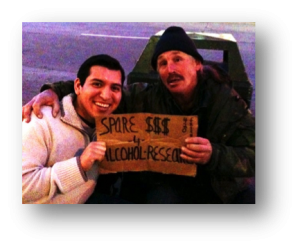
I’ve been on a journey over the last year to come clean, completely clean. Going Gay laid everything on the line: the pain, the mistakes, the fears and the quest for wholeness. Since I’ve started this journey I’ve been bombarded with messages from others longing to do the same. They don’t always feel what they believe. In fact, sometimes their beliefs conflict with their realities. They wouldn’t dare say it out loud, at least not in their churches or their homes. Sad, really. Those are the places we should be able to say what we think and feel without fear of abandonment, judgment or retribution.
I thought the reason I kept up appearances was so others would like me. In reality, I kept up appearances because I didn’t like myself. No amount of money, education or stuff changed that. Keeping it together was exhausting and unfulfilling. My self-hatred made me think even God looked down on me with a disparaging eye.
I’ve learned that the solution to some of life’s biggest problems often lie in the opposite behavior that seems most intuitive. I want to be alone when I’m depressed, but spending time with others helps me get through it. Giving things away seems to bring the most fulfilling rewards.
The same can be said for keeping up appearances. The only ones really impressed by them are us. When we look like we have it all together, it separates us from others who don’t feel like they do. In reality, none of us do. Let’s be honest, life is messy. Life is too short to pretend we’re living. So, in the words of the much too popular song from the movie Frozen, just let it go.
Tim
Share what you think below.
Hire Tim to speak at your event
 Tags: gays and Christianity, homosexuality and Christians, homosexuality and religion
Tags: gays and Christianity, homosexuality and Christians, homosexuality and religionDel.icio.us


TweetThis

Digg

StumbleUpon

Comments: 0 (Zero), Be the first to leave a reply!You might be interested in this:
 Why are the Christians silent?
Why are the Christians silent? Gays, Christians and Change Management
Gays, Christians and Change Management Believing is Perceiving
Believing is Perceiving  Book Review - Torn: Rescuing the Gospel from the Gays-vs.-Christians Debate
Book Review - Torn: Rescuing the Gospel from the Gays-vs.-Christians Debate Truth or Dare (to Love)Copyright © Tim Rymel [Keeping Up Appearances], All Right Reserved. 2014.
Truth or Dare (to Love)Copyright © Tim Rymel [Keeping Up Appearances], All Right Reserved. 2014.The post Keeping Up Appearances appeared first on Tim Rymel.

